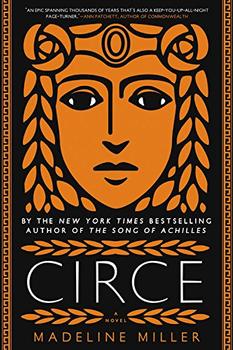Summary | Excerpt | Reading Guide | Discuss | Reviews | Beyond the book | Read-Alikes | Genres & Themes | Author Bio

Winner of the 2018 BookBrowse Fiction Award
The daring, dazzling and highly anticipated follow-up to the New York Times bestseller The Song of Achilles.
In the house of Helios, god of the sun and mightiest of the Titans, a daughter is born. But Circe is a strange child - not powerful, like her father, nor viciously alluring like her mother. Turning to the world of mortals for companionship, she discovers that she does possess power - the power of witchcraft, which can transform rivals into monsters and menace the gods themselves.
Threatened, Zeus banishes her to a deserted island, where she hones her occult craft, tames wild beasts and crosses paths with many of the most famous figures in all of mythology, including the Minotaur, Daedalus and his doomed son Icarus, the murderous Medea, and, of course, wily Odysseus.
But there is danger, too, for a woman who stands alone, and Circe unwittingly draws the wrath of both men and gods, ultimately finding herself pitted against one of the most terrifying and vengeful of the Olympians. To protect what she loves most, Circe must summon all her strength and choose, once and for all, whether she belongs with the gods she is born from, or the mortals she has come to love.
With unforgettably vivid characters, mesmerizing language and page-turning suspense, Circe is a triumph of storytelling, an intoxicating epic of family rivalry, palace intrigue, love and loss, as well as a celebration of indomitable female strength in a man's world.
NPR's Weekend Edition "Books To Look Forward To In 2018"
Esquire's "The 27 Most Anticipated Books of 2018"
Boston Globe's "25 books we can't wait to read in 2018"
The Millions "The Most Anticipated: The Great 2018 Book Preview"
Cosmopolitan's "33 Books to Get Excited About in 2018"
Much of Circe is an exploration into what it means to be female in a world of men and monsters. While it is usually tenuous to compare an author's latest novel to previous work, it does feel as if Miller wrote Circe as a conscious inversion of her prize-winning debut The Song of Achilles in nearly every aspect. The pool of inspiration may be the same – primarily Homer's epics – but whereas Achilles was very much a book about mortal men coming to grips with their own version of masculinity, Circe is about a divine woman trying to consolidate her myriad feminine identities as daughter, sister, lover, mother, witch, and goddess. Graceful and majestic in equal measures, Circe is sure to leave an indelible impression on readers both new and returning to Miller's singular reworkings of Greek myths...continued
Full Review
(791 words)
This review is available to non-members for a limited time. For full access,
become a member today.
(Reviewed by Dean Muscat).
 The nature of nymphs, the "least of the lesser goddesses," as they are referred to in Circe, is central to the novel. Circe, herself a sorceress or witch nymph, is most famous for turning Odysseus' crew into wild pigs and later becoming the hero's lover and adviser. In Greek mythology, nymphs are female spirits associated with the natural world. There are various kinds of nymphs presiding over all aspects of nature such as the Naiads and Oceanids of the waters and the Dryads of the forests. There are even breeze and star nymphs such as the Aurae and Asteriae.
The nature of nymphs, the "least of the lesser goddesses," as they are referred to in Circe, is central to the novel. Circe, herself a sorceress or witch nymph, is most famous for turning Odysseus' crew into wild pigs and later becoming the hero's lover and adviser. In Greek mythology, nymphs are female spirits associated with the natural world. There are various kinds of nymphs presiding over all aspects of nature such as the Naiads and Oceanids of the waters and the Dryads of the forests. There are even breeze and star nymphs such as the Aurae and Asteriae.
The nymphs are rarely central protagonists of myths and are more generally seen to be companions to the Olympians. As an infant, Zeus himself was protected and nursed by the nymphs...
This "beyond the book" feature is available to non-members for a limited time. Join today for full access.

If you liked Circe, try these:

by Ferdia Lennon
Published 2025
An utterly original celebration of that which binds humanity across battle lines and history.

by Allegra Goodman
Published 2025
A young woman and her lover are marooned on an island in this breathtaking saga, an epic story of love, faith, and defiance from the bestselling author of Sam.
There is no such thing as a moral or immoral book. Books are either well written or badly written. That is all.
Click Here to find out who said this, as well as discovering other famous literary quotes!